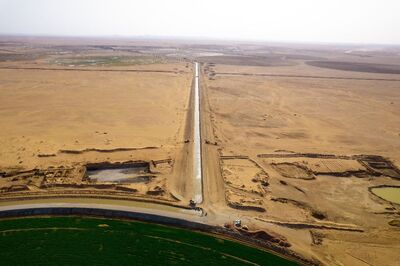Caterpillar Corporation | May 04, 2023
Turning the Desert Green with Rental Equipment
By Caterpillar
The Nubian Desert in north-eastern Sudan might not be anyone’s idea of promising farmland, but the Agriculture Investment Holding Company (Ethmar) Ltd, a joint venture between Royal Group of Abu Dhabi and DAL Group, Sudan’s biggest conglomerate, is investing $225m to change all that.
Once completed, the first of the project spanning 130,000 acres [52,609 ha] will be split into 500 rounded plots of 120 acres each, growing wheat, grapefruits and other crops. And progress has been brisk. After only a year into the project, the progress is already more than significant with 50 plots in operation.
“Yes, this is the desert, but we are turning it green,” says Osama Daoud Abdellatif, chairman of the DAL Group, going on to explain. “We have the Nile, then we have many other rivers, we have rain, we have underground water, and we have one of the flattest countries in the world,” he says. “Under the layers of sand, there is good soil. So, it’s not exactly difficult. Everything is there. You need to make it grow.”
And the secret to untap all of this is through irrigation. The way it works is that the Al Waha and Abu Hamad farms draw water from the Nile, just 10km away, which flows into 18km of canals. “This is a tough place, and we often have sandstorms, but the key is irrigation. If you can make irrigation work, you can make agriculture work,” says Nazim Khalil, CEO of Ethmar Agriculture Investment.
In Abu Hamad, temperatures can rise to 48° Celsius during the summer, which makes irrigation challenging as the water evaporates faster during the day. However, DAL is one of the few companies with enough financial muscle and know-how to make such a project work.
Initially started by Mr Daoud’s father to distribute Caterpillar tractors in the 1960s, there remains a connection to its origins, with one of the company’s subsidiaries being SUTRAC, Sudan’s only authorized Cat® Dealership. So naturally, Cat machines have played a big part in the project.
Originally, our involvement was to rent machines to help build the initial infrastructure, but over time, it became obvious to us that our experience could really add value to the project by doing the actual building of the canals themselves. Since then, our involvement has grown, and we’ve had to create a new earthmoving and construction sector within the Rental department of SUTRAC to service the project. Currently, we have 60 Cat machines on site.
You would think that getting that many machines there would be challenging on its own, but Yasir would disagree. “Of course, we’ve experienced many obstacles, but by working closely with the Cat team and by planning ahead, we’ve been able to overcome all of them.” Naturally, working on such a large job fills Yasir with pride. “This isn’t just an important project for SUTRAC and DAL Group, but also the people of Sudan as well, as once completed, it’s estimated that Project Green will create 5,000 new jobs in the immediate area.”
Once known as the world's breadbasket due to its large areas of arable land and plentiful access to water, Sudan has suffered from a lack of foreign investment in recent times. However, things are starting to change, and the DAL Group is a big part of it. “Agriculture, in our opinion, should not be just about growing raw materials but about adding value to the whole process by manufacturing, all sorts of things that come with it. We also believe agriculture should also be integrated with animal production,” says Mr Daoud.
According to the UN Food and Agriculture Organization, Sudan’s agricultural sector contributes to roughly a third of the country’s gross domestic product, provides a livelihood to about two-thirds of its working population, and uses only a third of its arable land. “Where in the world is there available land like in Sudan?” says Mr Daoud. “Sudan is, basically, an agricultural country,” he added. “Agriculture is the future here.” And with projects like The Green Project underway, it’s looking like it will be a bright one too.
Transforming For the Future
- Project Green currently covers 130,000 acres (420,000 acres in 2030) [105,218 ha]
- 276 pivots planted by the end of 2023 (500 pivots in 2026)
- 550 people are employed, 50% of which from local communities
- A total of 350 machines are in use













